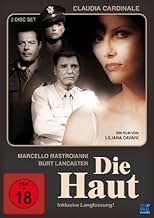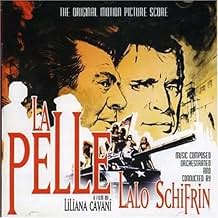VALUTAZIONE IMDb
6,6/10
1418
LA TUA VALUTAZIONE
Dopo che gli Alleati liberarono Napoli nel 1943, la vita per i locali non è molto più facile, soprattutto per le donne. Molti sacrificano la loro dignità e il loro morale per sopravvivere.Dopo che gli Alleati liberarono Napoli nel 1943, la vita per i locali non è molto più facile, soprattutto per le donne. Molti sacrificano la loro dignità e il loro morale per sopravvivere.Dopo che gli Alleati liberarono Napoli nel 1943, la vita per i locali non è molto più facile, soprattutto per le donne. Molti sacrificano la loro dignità e il loro morale per sopravvivere.
- Regia
- Sceneggiatura
- Star
- Premi
- 1 vittoria e 2 candidature totali
Peppe Barra
- Sarto
- (as Giuseppe Barra)
Rosaria della Femmina
- Amante di Jimmy
- (as Maria Rosaria Della Femmina)
Recensioni in evidenza
One of my all-time favorite war films. Americans might have trouble with it as it doesn't show us in the best possible light, but it is probably very close to the truth. It demonstrates better than any film I've seen how terrible and dispiriting life can be for a defeated population. Marcello Mastroianni gives another of his trademark world-weary but compassionate performances as the liaison between the American and Italian armies.
In 1943, in Naples, Germans have just left the city when the Americans arrive, commanded by Gen. Mark Clark (Burt Lancaster), having the Italian Captain Curzio Malaparte (Marcello Mastroianni) as the liaison. The population is starving, with women and children prostituting themselves for food. Principessa Consuelo Caracciolo (Claudia Cardinale) is a noble Italian friend of Malaparte, and seems to be very adapted to all situations. Private Jimmy Wren (Ken Marshall) is the support of Captain Malaparte, and falls in love with a local girl. Honorific Colonel Deborah Wyatt (Alexandra King), an arrogant pilot and wife of an American Senator, comes to Naples to be promoted and get votes for her husband and the American president. Malaparte is assigned to show her the situation of the city. This movie is very strange, bizarre and violent. But although paradoxical, it is also fascinating. It shows a defeated people, needing to sell sons and daughters to survive. The last scene, when a tank passes over a local and Jimmy comes to apologize to Malaparte is fantastic. It shows the relation between winners and losers in a war. The cast has Burt Lancaster, Marcello Mastroianni and Claudia Cardinale, among others good actors and actresses. I like very much the work of Liliana Caviani, but this film certainly is not indicated for all audiences. My vote is seven.
Title (Brazil): `A Pele' (`The Skin')
Title (Brazil): `A Pele' (`The Skin')
I have more or less the same feelings toward The Skin as I do towards Liliana Cavani's more well-known The Night Porter. Both movies deal with provocative and uncomfortable sexual themes/situations taking place during World War II. Both are daring and sound fascinating on paper. Both are also weirdly boring, making me feel as though Cavani is a filmmaker who's admirably daring and willing to go to places most other directors won't go, but at the same time, can't really tell a story or make things properly involving.
Much of what The Skin and The Night Porter explores is thought-provoking and boundary-pushing. These are difficult stories that I'm glad have been told, but I just wish they were told better. I was shocked by how boring The Night Porter was, and I'm similarly surprised/disappointed by how dull and poorly paced The Skin was.
I also didn't like how the whole thing was in Italian, even though many scenes involve characters who don't speak the same language interacting and needing translators. It's very odd and distracting to have to remind yourself "I hear Italian right now, but in the film's universe, this character is actually speaking English at the moment, and so the actual Italian characters can't understand him/her."
The Skin succeeds in being thought-provoking and disturbing, but fails elsewhere, as a movie. And it's not that I think it should be "entertaining" in the traditional sense, given the subject matter. I just think it should be more involving and engrossing on a gut level. I can honestly understand why this one wallows in obscurity, despite some things here that are certainly able to be appreciated.
Much of what The Skin and The Night Porter explores is thought-provoking and boundary-pushing. These are difficult stories that I'm glad have been told, but I just wish they were told better. I was shocked by how boring The Night Porter was, and I'm similarly surprised/disappointed by how dull and poorly paced The Skin was.
I also didn't like how the whole thing was in Italian, even though many scenes involve characters who don't speak the same language interacting and needing translators. It's very odd and distracting to have to remind yourself "I hear Italian right now, but in the film's universe, this character is actually speaking English at the moment, and so the actual Italian characters can't understand him/her."
The Skin succeeds in being thought-provoking and disturbing, but fails elsewhere, as a movie. And it's not that I think it should be "entertaining" in the traditional sense, given the subject matter. I just think it should be more involving and engrossing on a gut level. I can honestly understand why this one wallows in obscurity, despite some things here that are certainly able to be appreciated.
As a member of the US Air Force stationed in Naples during the movie I had the opportunity to appear in the film. I think I had 26 appearances in the film, all as a non-speaking extra. I got to know some of the actors, Ken Marshall was a really decent guy, Burt Lancaster (had a photo with him) always took 2 or 3 takes to get it right, Marcello Mastroiani was amazing, he spoke his lines like he was telling a story over dinner, just flawless! Claudia Cardinale was really nice the couple times we talked. It was really an adventure doing the film, there were many hours of just sitting around waiting for something to happen. Months later when the film was released they had two showings at the NATO base. It was a sell out both times and all you could here was everyone (along with me) saying things like: "Hey there I am, That was me, Look look, there I am again"! Someday I would like to see it again so I could hear what it was about. One last thing, the most memorable part of the film for me was when the American tanks (Korean war vintage) went through the town and the Italians all came out and cheered. That scene had to be done twice and then spliced together. Once the director yelled (in Italian) "cut", Bert stood up in his jeep, with his hands on his hips, looked at a now silent cast and proclaimed in his strong voice "In my 35 years of movie making, this is the most f***ed up fiasco I have ever been involved in"! Maybe that made it in the directors cut!
This movie is based on the true memoirs of the main character (Curzio Malaparte) during his time when he acted as diplomatic liaison between the Allied forces and the Italian in the newly occupied Italy. The book is a collection of short stories depicting the collapse of the Italian society under Allied occupation. There is no story line between those short stories. The movie puts them in chronological order, but the reigning chaos and lack of moral message (the message is exactly the lack of morality) can confuse the spectator.
This is a very original war movie, in that the main theme is the not the war front. The Allied are not viewed from their own perspective, which is one of true liberators. Instead, the movie shows the Italian people courting the Allies as liberators in order to escape from starvation. The Allies themselves are caught in a trap where they know the Italian hospitality isn't sincere, but are unable to understand why. They don't realize that before them, the Germans were courted as liberators too, and that in this context of food shortage and general poverty, the only way the Italians have to secure their survival is to play that game.
Malaparte (played by Marcello Mastroiani) acts then as a translator, helping the Americans as a guide would help a tourist, by explaining in each situation why people are acting in this seemingly dishonorable way.
La Pelle (The Skin) would make more sense if compared to Malaparte's twin book on the occupied Europe (Kaputt, or Broken to Pieces). In the latter, he portrays the Nazi way of oppressing through violence. In La Pelle, he shows how the Americans achieve a similar result through economic means, while refusing any responsibility. In Kaputt, Jewish women are made prostitutes by the German Army to escape death by the bullet; in La Pelle, Italian women become prostitutes for the American Army to escape death by starvation.
This is a very original war movie, in that the main theme is the not the war front. The Allied are not viewed from their own perspective, which is one of true liberators. Instead, the movie shows the Italian people courting the Allies as liberators in order to escape from starvation. The Allies themselves are caught in a trap where they know the Italian hospitality isn't sincere, but are unable to understand why. They don't realize that before them, the Germans were courted as liberators too, and that in this context of food shortage and general poverty, the only way the Italians have to secure their survival is to play that game.
Malaparte (played by Marcello Mastroiani) acts then as a translator, helping the Americans as a guide would help a tourist, by explaining in each situation why people are acting in this seemingly dishonorable way.
La Pelle (The Skin) would make more sense if compared to Malaparte's twin book on the occupied Europe (Kaputt, or Broken to Pieces). In the latter, he portrays the Nazi way of oppressing through violence. In La Pelle, he shows how the Americans achieve a similar result through economic means, while refusing any responsibility. In Kaputt, Jewish women are made prostitutes by the German Army to escape death by the bullet; in La Pelle, Italian women become prostitutes for the American Army to escape death by starvation.
Lo sapevi?
- QuizThe film's editor was Ruggero Mastroianni, Marcello Mastroianni's brother.
- BlooperAt approximately 19 mn into the movie and again at approximately 1h18 mn, Goldberg, the roommate of Jimmy Wren (Ken Marshall), is seen reading an issue of the comic book "Batman". However the cover is clearly shown and is in fact that of issue N°257, published in August 1974, ie 31 years after the events of the movie.
- ConnessioniFeatured in Napoli '44 (2016)
- Colonne sonoreLa Pelle
written by Roberto De Simone
sung by Maria Kelly
recorded on "La Gatta Cenerentola"
published by La voce del padrone; EMI Italiana
I più visti
Accedi per valutare e creare un elenco di titoli salvati per ottenere consigli personalizzati
- How long is The Skin?Powered by Alexa
Dettagli
- Data di uscita
- Paesi di origine
- Sito ufficiale
- Lingua
- Celebre anche come
- The Skin
- Luoghi delle riprese
- Casa Malaparte, Isle of Capri, Napoli, Campania, Italia(Villa of the main character, Curzio Malaparte)
- Aziende produttrici
- Vedi altri crediti dell’azienda su IMDbPro
- Tempo di esecuzione
- 2h 11min(131 min)
- Mix di suoni
Contribuisci a questa pagina
Suggerisci una modifica o aggiungi i contenuti mancanti





























